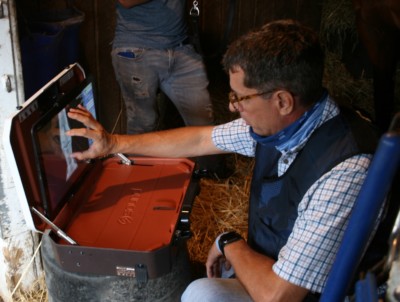Laboratory testing alone cannot be effective in maintaining racing integrity. The RMTC advocates for comprehensive strategies that include surveillance, review of treatment records, premises and vehicle inspections, and analysis of substances and contents of syringes to deter and detect the use of banned substances and to control the use of legitimate therapeutic medications in order to protect safety and integrity in racing and training.
The RMTC provides scientific input and builds consensus among stakeholders for the adoption Model Rules* on a range of subjects including out of competition testing, establishing a list of prohibited substances, implementing controls on the use of corticosteroids and nonsteroidal anti-inflammatory medications and other therapeutic medications, constraining the use of intra-articular injections, prohibiting the use of anabolic steroids, controlling the off-label use of bisphosphonates and other drugs, and establishing regulatory visibility of medication records.
*Model Rules promote uniformity in the regulation of horse racing across North America. The RMTC, or other engaged organizations or individuals, proposes Model Rules to the The Association of Racing Commissioners International (ARCI), a group comprised of representatives of individual states’ racing regulators that engages in collective policy formation. Individual ARCI members advocate for adoption of Model Rules at the State level.


In response to the supply and demand concerns associated with available equine veterinarians to meet the racing industry’s needs, in 2024 the Racing Medication & Testing Consortium (RMTC) created the Racing Industry Veterinary Student Externship Program. This program provides a shared experience for veterinary students with racetrack practitioners and regulatory veterinarians. The need for establishing such a program was two-fold:
- To promote and provide exposure to and networking opportunities in equine veterinary medicine within the racing industry. The future of horseracing’s veterinary care requires fostering exposure and mentoring young veterinarians.
- To establish a mechanism to identify, recruit, and retain young veterinarians and encourage professional pursuits relevant to horse racing needs for veterinary care and the promotion of enhanced safety and welfare for racehorses.
“The success of the racing industry is dependent on the recruitment, availability, and retention of motivated attending and regulatory veterinary professionals to oversee the safety and welfare of its participants,” said Dr. Michael Hardy, RMTC Executive Director. “The RMTC will join other equine industry organizations taking an active role in promoting careers in equine veterinary medicine.”
RMTC accepts applications from veterinary students across the US and Canada. The selection committee follows strict evaluation metrics to score and rank each applicant based on experience, a letter of intent, curriculum vitae, and letters of recommendation.
In 2025, this program gained significant industry support, with all 25 externships funded by program sponsors, including AVMA Trust, AAEP Foundation for the Horse, Breeders’ Cup Ltd, Horseracing Integrity and Safety Authority (HISA), Petvetcare Centers, New York Thoroughbred Horsemen’s Association, Indiana HBPA, Oak Tree Racing Association, Del Mar Thoroughbred Club, 1S/T Racing, CDI, and The Jockey Club.
“The AVMA Trust (AVMA PLIT and AVMA LIFE) is proud to sponsor RMTC’s 2025 Racing Industry Veterinary Student Externship Program for the second year. We look forward to seeing this program continue to grow”, said Tracey Gray-Walker, CEO, AVMA Trust.
NYTHA President, Tina Marie Bond added, “We’ve seen the early success of these veterinary externships and want to support the expansion of this program. Quality veterinary care is paramount in racing today. It is vital to introduce students to our sport and have them gain critical experience with both regulatory and private veterinarians in a racetrack environment.”
The RMTC participates in domestic and international meetings of racing regulators and other stakeholder organizations. The Executive Director, Board of Directors, and Scientific Advisory Committee Members serve on committees worldwide establishing policy on horse welfare, racetrack veterinary practice, tactical research, prohibited practices, and anti-doping programs.



